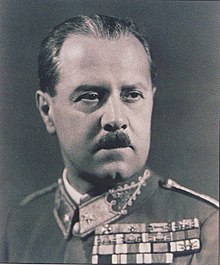Géza Lakatos
|
Vitéz Géza Lakatos de Csíkszentsimon |
|
|---|---|
 |
|
| 36th Prime Minister of the Kingdom of Hungary | |
|
In office 29 August 1944 – 16 October 1944 |
|
| Monarch |
Miklós Horthy as Regent |
| Preceded by | Döme Sztójay |
| Succeeded by |
Ferenc Szálasi (Leader of the Nation) |
| Personal details | |
| Born |
30 April 1890 Budapest, Kingdom of Hungary, Austria-Hungary |
| Died | 21 May 1967 (aged 77) Adelaide, South Australia, Australia |
| Nationality | Hungarian |
| Political party | Independent |
| Profession | Politician |
Knight Géza Lakatos de Csíkszentsimon (Hungarian title/name: "vitéz lófő csíkszentsimoni Lakatos Géza"; in German: Geza Ritter Lakatos, Edler von Csikszentsimon) (Budapest, 30 April 1890 – Adelaide, 21 May 1967) was a colonel general in the Hungarian Army during World War II who served briefly as Prime Minister of Hungary, under governor Miklós Horthy from 29 August 1944, until 15 October 1944.
He graduated at Ludovica Military Academy. He was a military attaché in Prague from 1928 to 1934. On 5 August 1943 he succeeded vitéz Gusztáv Jány as commander of the Second Army. On 1 April 1944 he was appointed commander of the 1st Hungarian Army, but this was only until 15 May 1944.
In August 1944 supporters of Lakatos and Horthy, armed with one tank, overthrew the German-installed government of Döme Sztójay. Lakatos's military government stopped the deportation of Hungarian Jews, with acting Interior Minister Béla Horváth ordering Hungarian gendarmes to use deadly force against any deportation effort. Lakatos also reopened peace talks with the Allies that had previously been begun by Miklós Kállay. He even went as far as to begin talks with the Soviets. On 15 October 1944, Horthy tried to force the Germans out entirely and concluded an armistice with the Allies. However, when Horthy announced this in a nationwide radio address, the Germans kidnapped Horthy's son, Miklós Horthy, Jr., and Horthy surrendered to them. The far right fringe Arrow Cross Party, backed by the Germans, immediately staged a coup and took full control of the government. Lakatos was forced to resign that day, and was imprisoned by the Germans in Sopronkőhida. After that he was interned into Sopron.
...
Wikipedia
